hCG Hypothalamus
Hypothalamus Hormones
And Pituitary hCG Relationship
hCG Hypothalamus Hormones Functions
The hCG hypothalamus is a region of the brain that controls an immense number of bodily functions. Between them, secretion of hormones from the anterior pituitary is under strict control by hypothalamus hormones.
These hypothalamus hormones reach the anterior pituitary through the following route: It is located in the middle of the base of the brain, and encapsulates the ventral portion of the third ventricle.
The utility of this unconventional vascular system is that "minute quantities of hypothalamus hormones are carried in a concentrated form directly to their target cells in the anterior pituitary, and are not diluted out in the systemic circulation."
The hCG hypothalamus is responsive to light, olfactory stimuli, steroids, neurally transmitted information, autonomic inputs, blood-borne stimuli, stress, invading microorganisms and "gastric reflexes."
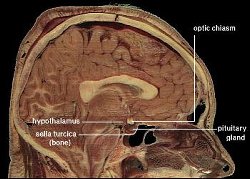
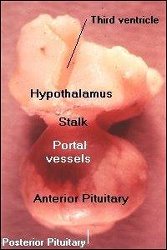
hCG Hypothalamus Influence To Physiologic Processes
It would be difficult to overstate the influence of hCG hypothalamus and pituitary hCG hormones over physiologic processes.
The target cells for most of the hormones produced in these tissues are themselves endocrine cells, and "a seemingly small initial signal is thus amplified to cause widespread effects on many cells and tissues."
The close anatomical and functional relationships between hCG hypothalamus and pituitary hCG force an integrated discussion of these organs.
The focus here is to introduce the major hypothalamus hormones produced by these organs, with significant emphasis on how hCG hormone secretion and action are controlled.
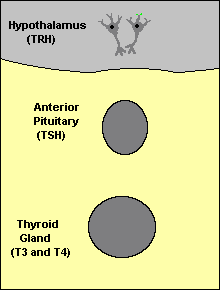
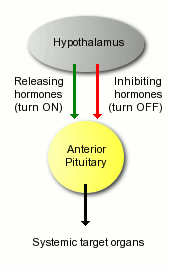
hCG Hypothalamus "Negative Feedback"
The pituitary gland is often portrayed as the "master gland" of the body.
Such praise is justified in the sense that the anterior and posterior pituitary secrete a battery of hormones that collectively influence all cells and affect virtually all physiologic processes.
The pituitary gland may be king, but the power behind the throne is clearly the hypothalamus.
As alluded to in the last section, "some of the neurons within the hypothalamus - neuro secretory neurons - secrete hormones that strictly control secretion of hormones from the anterior pituitary.
The hCG hypothalamuc hormones are referred to as releasing hormones and inhibiting hormones, reflecting their influence on anterior pituitary hormones."
hCG Hypothalamus Release Of Hormones
hCG Hypothalamus releasing and inhibiting hormones are carried directly to the anterior pituitary gland via hypothalamic-hypophyseal portal veins.
"Specific hypothalamus hormones bind to receptors on specific anterior pituitary cells, modulating the release of the hormone they produce."
Clearly, robust control systems must be in place to prevent over or under-secretion of hypothalamus and anterior pituitary hCG hormones.
A prominent mechanism for control of the releasing and inhibiting hormones is negative feedback.
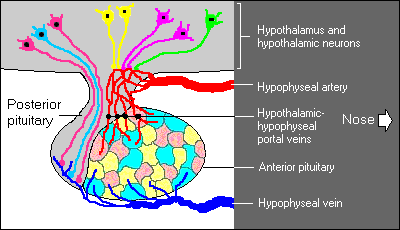
Hypothalamus Hormones "Glucose Signals"
Another type of feedback is seen in endocrine systems that regulate concentrations of blood components such as glucose. Drink a glass of milk or eat a candy bar and the following (simplified) series of events will occur:
Glucose from the ingested lactose or sucrose is absorbed in the intestine and the level of glucose in blood rises.
Elevation of blood glucose concentration stimulates endocrine cells in the pancreas to release insulin.
Insulin has the major effect of facilitating entry of glucose into many cells of the body - as a result, blood glucose levels fall.
When the level of blood glucose falls sufficiently, the stimulus for insulin release disappears and insulin is no longer secreted.When you think about the adrenal glands, you should think about stress. Stress can take many forms: taking an examination, recovering from a broken bone, running away from an invading army, or maintaining proper levels of energy substrates in the face of even mild starvation. For human males, there is even considerable stress associated with shopping.
Source Reference
This information including graphics has been excerpted from:
Source reference:
[http://arbl.cvmbs.colostate.edu/hbooks/pathphys/endocrine/hypopit/anatomy.html]
with very slightly modifications for the purpose to enrich visitors knowledge.
More information can be found at source, such as numerous other examples of specific endocrine feedback circuits are presented in the sections on specific hormones or endocrine organs.
Human Digestion Process
The whole digestive system is around 9 metres long. In a healthy human adult this process can take between 24 and 72 hours.
Phases of Gastric Secretion
Cephalic phase
This phase occurs before food enters the stomach and involves preparation of the body for eating and digestion.
Sight and thought stimulate the cerebral cortex. Taste and smell stimulus is sent to the hypothalamus and medulla oblongata.
After this it is routed through the vagus nerve and release of acetylcholine. Gastric secretion at this phase rises to 40% of maximum rate.
Acidity in the stomach is not buffered by food at this point and thus acts to inhibit parietal (secretes acid) and G cell (secretes gastrin) activity via D cell secretion of somatostatin.
Gastric phase
This phase takes 3 to 4 hours. It is stimulated by distention of the stomach, presence of food in stomach and decrease in pH.Distention activates long and myentric reflexes. This activates the release of acetylcholine which stimulates the release of more gastric juices.
As protein enters the stomach, it binds to hydrogen ions, which lowers the pH of the stomach to around pH 1-3.
Inhibition of gastrin and HCl secretion is lifted. This triggers G cells to release gastrin, which in turn stimulates parietal cells to secrete HCl.
HCl release is also triggered by acetylcholine and histamine.
Intestinal phase
This phase has 2 parts, the excitatory and the inhibitory. Partially-digested food fills the duodenum.This triggers intestinal gastrin to be released. Enterogastric reflex inhibits vagal nuclei, activating sympathetic fibers causing the pyloric sphincter to tighten to prevent more food from entering, and inhibits local reflexes.
Source Reference:Wikipedia
Back to What Is hCG?
Order Your hCG Hypothalamus Hormone Now